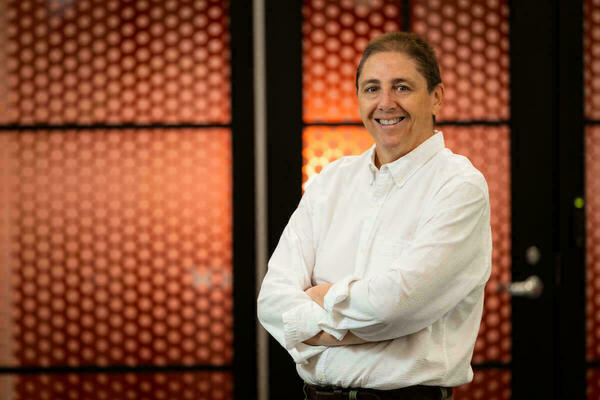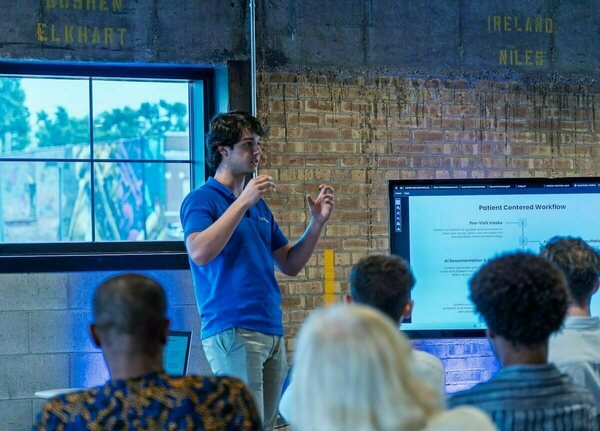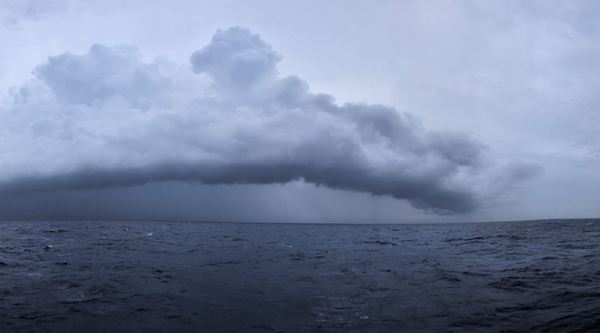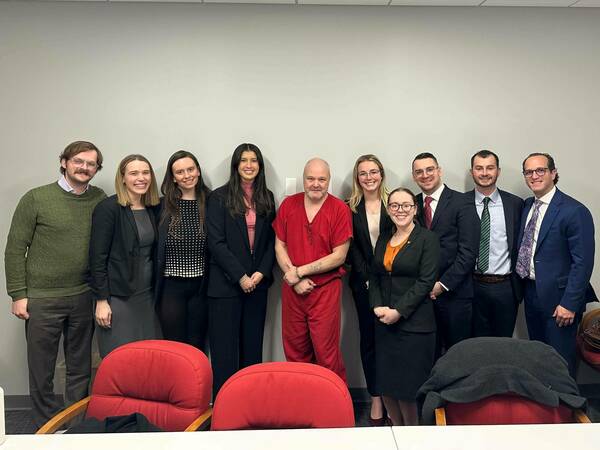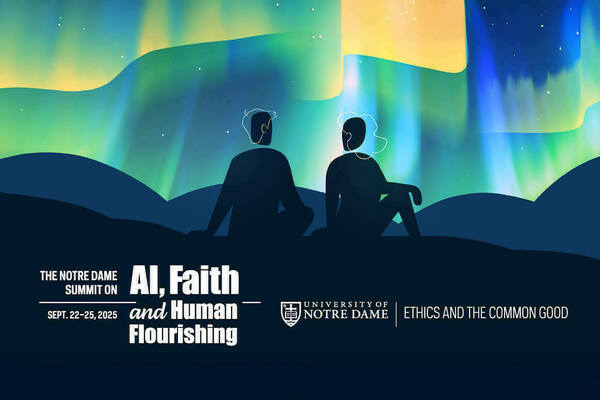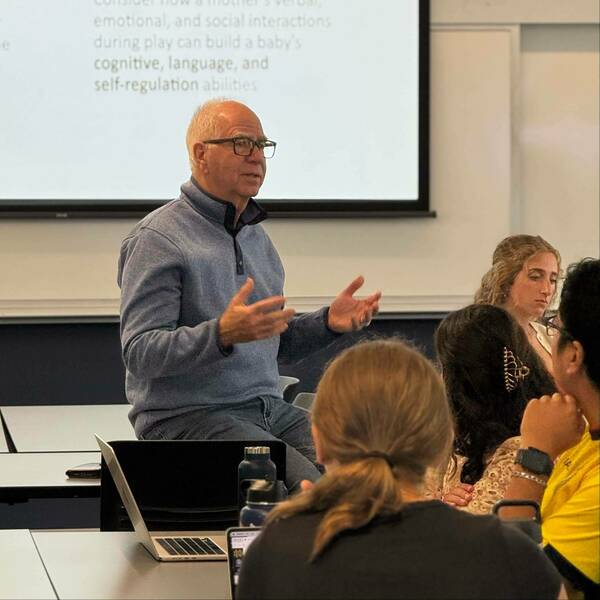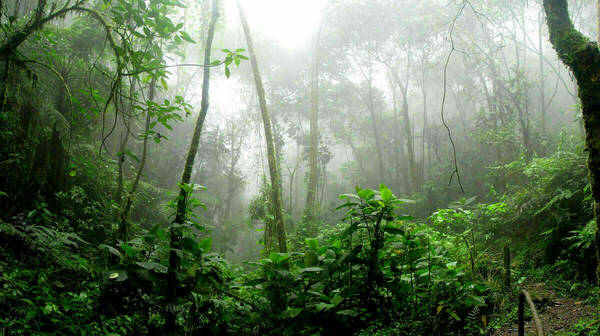Managing director brings interdisciplinary background to Bioengineering & Life Sciences Initiative
This story is part of a series of features highlighting the managing directors of the University's strategic initiatives. The managing directors are key (senior) staff members who work directly with the faculty directors to help implement and operationalize the vision for the initiatives, oversee initiative staff, and serve as thought partners for the faculty directors.
Even though he’s not a bench scientist, Arnie Phifer loves discovery. Even more importantly, he believes in the work of scientists, the collaboration their work offers, and the opportunities their research can present to save lives and improve the health and well-being of all.
As the managing director of the Bioengineering & Life Sciences (BELS) Initiative, Phifer helps lead efforts on campus to advance human health through interdisciplinary biomedical research and training. BELS, which is a joint initiative of Notre Dame’s College of Engineering and College of Science and a key priority in the University’s strategic framework, supports research that applies engineering principles to biological systems. The BELS Initiative works to create new technologies and approaches to the detection, prevention, and treatment of disease.
“Our primary goals are to invest in creative people, advanced instruments, and big ideas,” Phifer said. “We want to generate new kinds of biomedical research and activity in the exciting areas where engineering and life sciences meet. Notre Dame has many faculty members, students, and staff already working in this space, so much of my work is to see what resources they need to succeed.”
Phifer’s entry into the world of big academic science was nontraditional. He was a history major at Notre Dame for his undergraduate degree, but went on to obtain a master of science degree in geography from the University of Massachusetts Amherst.
A chance introduction to another Notre Dame graduate at a Notre Dame Alumni Association club event in Texas led Phifer into research administration work. From there, he worked for a small wildlife conservation organization in Austin and then the large American Association for the Advancement of Science in Washington, DC. Phifer eventually ended up in Southern California working with astronomers and telescopes at the Carnegie Institution for Science, a storied astronomical observatory.
A job posting from his alma mater came across Phifer’s desk in 2010, at just the moment when he was looking to do something different. He applied, was offered the position, and immediately began working with Paul Bohn, the Arthur J. Schmitt Professor of Chemical and Biomolecular Engineering and professor of chemistry and biochemistry at Notre Dame and, most recently, inaugural director of the BELS Initiative.
In time, Phifer was named associate director of the Advanced Diagnostics & Therapeutics initiative, which later grew into Notre Dame’s Berthiaume Institute for Precision Health. During that same period, and also under Bohn, he served as operations director for the National Science Foundation’s Center for Bioanalytic Metrology, an industry-university cooperative research center led by Notre Dame on behalf of more than a dozen industry and academic partners. When Bohn was asked to lead the BELS Initiative, he offered Phifer the opportunity to join him.
The career move has given Phifer the chance to help advance science in a way that he might not have thought possible 15 years ago.
“At the launch of the BELS Initiative, we worked with faculty to craft a set of inaugural research themes to pursue,” Phifer said. “First, we are conducting fundamental research to help us understand how the human body works, much of which remains a mystery. Second, we are applying engineering principles to biological systems in a variety of innovative ways. And finally, we are working to ensure that Notre Dame’s discoveries and inventions are accessible to people who are under-resourced or geographically remote—both here in the United States and around the world.”
One of the first priorities to start that work is to invest in people and the work that they do best, Phifer said. “One of our long-term goals is to really lift our capabilities and expertise in key areas of biomedical research, to burnish our reputation or make a new name for ourselves in areas where Notre Dame can lead. Fundamental to this is working with the colleges and departments to attract the kind of visionary faculty who will have a lasting impact on the University.”
But there are also many such faculty already here on campus, Phifer explained, and to start supporting them, the first four multidisciplinary research teams have been awarded BELS Initiative grants—some of the most substantial internal project awards ever given at Notre Dame. These teams are undertaking a range of ambitious projects.
One is investigating how artificial intelligence and large language models can be used to create a “digital twin” of each person’s cardiovascular system, which could help doctors identify problems and plan treatment. Another team is looking at the formation and function of often-overlooked cellular structures called biomolecular condensates, which may be involved in cancer, neurodegeneration, and type 2 diabetes. A third team is examining whether and how CAR T-cell therapy, a personalized form of immunotherapy that trains an individual’s own immune cells to recognize and destroy cancer, can be made more affordable if the specialized cells are produced in low earth orbit. The fourth team is testing the environment directly surrounding cancerous tumors to see how it affects their growth and spread, the goal being to find more effective treatment interventions.
The second priority is to provide cutting-edge instruments to help Notre Dame researchers advance their innovative projects. As a start, Phifer said the BELS Initiative has ordered a cryogenic transmission electron microscope, a first for campus and a major advance in capabilities once it is installed next year. They are also partnering with Notre Dame Research to enhance the University’s flow cytometry capacity. Not only will these initial improvements serve current faculty and students, they will also help recruit new faculty.
These types of scientific investments and collaborations are what motivate Phifer the most, and being able to contribute to their success gives him great professional satisfaction. “I get to be around these incredibly smart people and watch them discover amazing things,” he said. “It’s exciting to be part of an enterprise like this and to witness that kind of creativity. I’m really here to help them learn and discover new knowledge, and I hope to give them the tools they need to succeed.”
Phifer added that his motivation is strengthened and sustained by the love of his family—in particular, his wife of 30 years and their two daughters—as well as his Catholic faith and his beloved colleagues.
It is this third factor on which Phifer really leans in: He believes that teamwork and camaraderie are some of the best ingredients for successful scientific collaborations. “My favorite thing is the people, and seeing how everyone works together—faculty and students—here at Notre Dame,” Phifer said. “It’s really special.”
That this type of transformative biomedical research is being done at a university without a medical school is rare and allows Notre Dame to excel in a new way, Phifer explained. “Some of what we do is not the kind of work a medical school would fund because it’s outside their mission, but Notre Dame has the flexibility to take gambles and see what pays off.”
Phifer works out of the recently completed McCourtney Hall East and is still setting up his personal work area. The new environment seems appropriate for the hope of what lies ahead for both Phifer and BELS. “These buildings are filled with promising young people from around the world—and some of their personal stories are just incredible,” Phifer said. “It’s really inspiring to see them come here to South Bend to conduct research to cure diseases and make life better for people, especially those who are vulnerable and underserved.”
Phifer sensed that he has been moving toward his current role his entire life, gathering the knowledge he would eventually need along the way and meeting the right people to get him here. “I know I have a very privileged position here, being able to help this amazing work unfold. It’s very thrilling.”
Get involved
Learn more about the Bioengineering & Life Science Initiative
Meet the newest research teams
Additional features
Joel Day, Democracy Initiative
Originally published by at ndworks.nd.edu on September 15, 2025.
Latest Research
- Notre Dame’s seventh edition of Race to Revenue culminates in Demo Day, a celebration of student and alumni entrepreneurship…
- Monsoon mechanics: civil engineers look for answers in the Bay of BengalOff the southwestern coast of India, a pool of unusually warm water forms, reaching 100 feet below the surface. Soon after, the air above begins to churn, triggering the summer monsoon season with its life-giving yet sometimes catastrophic rains. To better understand the link between the formation of the warm pool and the monsoon’s onset, five members of the University of Notre Dame’s Environmental Fluid Mechanics Laboratory set sail into the Bay of Bengal aboard the Thomas G. Thompson, a 274-foot vessel for oceanographic research.
- Exoneration Justice Clinic Victory: Jason Hubbell’s 1999 Murder Conviction Is VacatedThis past Friday, September 12, Bartholomew County Circuit Court Judge Kelly S. Benjamin entered an order vacating Exoneration Justice Clinic (EJC) client Jason Hubbell’s 1999 convictions for murder and criminal confinement based on the State of Indiana’s withholding of material exculpatory evidence implicating another man in the murder.
- Notre Dame to host summit on AI, faith and human flourishing, introducing new DELTA frameworkThe Institute for Ethics and the Common Good and the Notre Dame Ethics Initiative will host the Notre Dame Summit on AI, Faith and Human Flourishing on the University’s campus from Monday, Sept. 22 through Thursday, Sept. 25. This event will draw together a dynamic, ecumenical group of educators, faith leaders, technologists, journalists, policymakers and young people who believe in the enduring relevance of Christian ethical thought in a world of powerful AI.
- Preparing Global Leaders: Notre Dame Students Put Early Childhood Development Science into PracticeThis fall, Notre Dame students are turning research into real-world solutions. In a unique course, Early Childhood Development and Poverty Alleviation: A Global Perspective, 27 students are learning how the science of early childhood development can break cycles of poverty — and then applying…
- How can we have better conversations about environmental conservation? New Notre Dame research charts a path.As the planet faces mounting environmental crises, including a decline in global biodiversity, a new study from the University of Notre Dame calls for a seemingly simple yet transformative practice: better conversations. In a co-authored paper published in Conservation Biology, Daniel C. Miller outlines five key principles to foster more effective and inclusive dialogue about conservation. The paper builds on more than a decade of collaborative work in conservation social science and presents a framework to address one of the field’s most pressing yet underexamined issues—how conservationists talk to one another.



